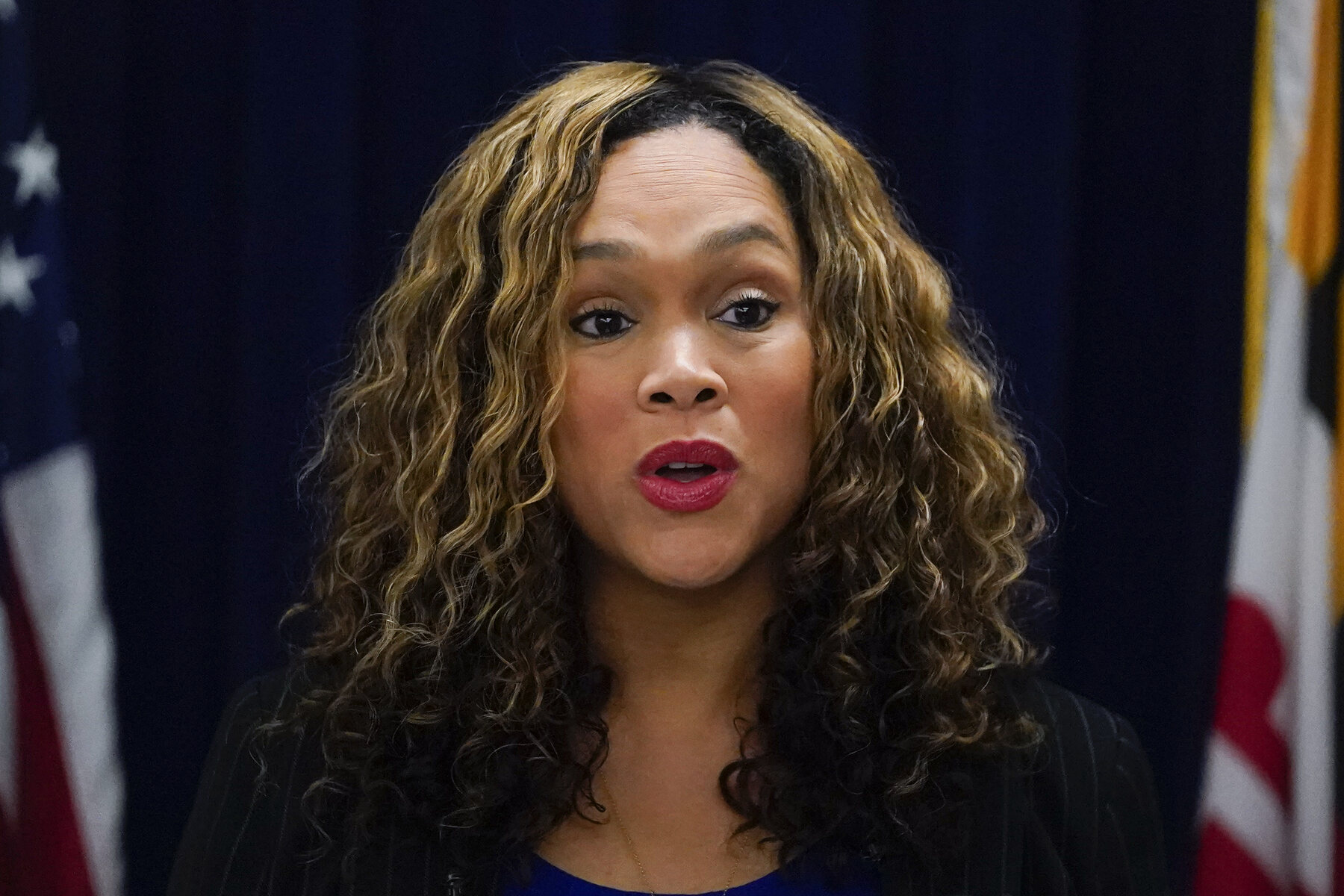This story was originally published by Capital B. Please sign up for Capital B’s newsletter, which comes out each week, to follow similar stories.
Next month will mark 10 years since Marilyn Mosby became the youngest person in the U.S. elected to lead a prosecutor’s office. On Thursday, she’ll find out whether she will spend up to 40 years in prison.
The former Baltimore City state’s attorney was convicted last year for making an early withdrawal from her own retirement account by using a temporary COVID financial hardship provision under false pretenses to purchase a condo in Florida. She was also convicted of making false statements on a mortgage application about the source of some funds to lock in a lower interest rate.
Prosecutors have recommended that Mosby be sent to federal prison for 20 months. Mosby is the only person in Maryland and the United States to get charged by the federal government for lying about her eligibility for an early distribution of $90,000 of her own retirement funds and on a mortgage loan application about the source of $5,000. Capital B has filed a FOIA request with the Justice Department that has not been fulfilled as of publication.
Shocked at the prosecutor’s incarceration recommendation, Mosby questioned in an interview with Capital B why prosecutors would recommend prison time for someone with no previous criminal record.
“I’ve never been in trouble. Never had any issues. It’s illogical,” said Mosby, who has two daughters. “So when you say, ‘Is the possibility of getting 40 years possible?’ Yes, it’s a real possibility.”
Mosby’s attorneys have requested a sentence based on the federal guidelines that equals between a year to 18 months of probation, according to court documents.
The only victim in Mosby’s case is Mosby herself. But the facts of her case have either been misrepresented or confusing in some news reports. Read on as Capital B breaks it all down.
Were COVID-relief funds stolen?
No.
Mosby was not among the over 2,200 businesses, agencies, celebrities, and others who collectively stole billions of federal COVID-19 relief funds.
She was originally charged in January 2022 on a four-count indictment, but tried separately and in a different part of Maryland as per her request to get a fair trial.
“The indictment is more telling for what is not in the indictment, rather than what is in there,” A. Scott Bolden, Mosby’s defense attorney, said at the time. The charges are “a far cry from criminal tax evasion and tax-related charges that were at the heart of this federal investigation.”
Her ex-husband, Nick Mosby, blames himself for her financial and legal troubles, but he hasn’t been charged with any wrongdoing. No tax-related charges were included in the indictment, despite several references about Mosby’s and her ex-husband’s taxes in the court documents.
As the months drew closer to Mosby’s first trial, her financial situation shifted drastically, especially after losing her third term. She couldn’t afford a private defense team and expert witnesses to assist in her case. The judge assigned a public defender after she proved her indigent status.
Mosby was convicted by two separate federal jury panels.
First, for two-counts of perjury. Mosby was convicted for lying about why she needed to make two hardship withdrawals from her own retirement account — the city of Baltimore’s Deferred Compensation Plan — that totaled $90,000. She said the COVID-19 pandemic put her travel company, Mahogany Elite Consulting LLC., that she launched in 2019, into the red before it could get started.
Prosecutors countered Mosby’s financial woes to her gross salary in 2020 as Baltimore City state’s attorney that was over $247,000 and never was reduced, according to the indictment. Prosecutors at trial said Mosby’s travel business didn’t have any clients. Mosby provided business log expenses at trial.
On the second indictment, Mosby was convicted of making false statements on one mortgage application about where she received a $5,000 gift to lock in a lower interest rate for a condo in Longboat Key, Florida, near Sarasota.
As part of the application, Mosby responded that she received the monetary gift from her now ex-husband and former president of the Baltimore City Council. According to the evidence presented at trial, Mosby did not receive a $5,000 gift from anyone, but rather she transferred $5,000 to her ex, and he then transferred the funds back to her.
The jury acquitted Mosby of making false statements on another application for an eight-bedroom home in Kissimmee near Disney World that she sold in Nov. 2021.
Have others been prosecuted for similar actions?
Fidelity Investments is one of the nation’s largest mutual fund companies, with 25.8 million participants. In 2020, 22% of their members took money out of their retirement accounts and 1,419,000 used the CARES Act hardship provision as a reason for withdrawing funds, according to a July 2021 Congressional Research Services report. Vanguard, the fourth-largest retirement fund company in the country with 5.5 million participants, had 5.7% receive a COVID-related distribution.
That provision allowed participants to make an early withdrawal of up to $100,000 without paying the usual 10% tax penalty on the condition that COVID-19 caused an adverse financial consequence. Those reasons include: being laid off, reduced work hours, unable to work due to lack of child care; you or a loved one was diagnosed with COVID; or the closing or reduction of hours of a business they owned or operated.
The federal government argues that Mosby did not have any of those side effects of the pandemic because she maintained her position and salary as the chief prosecutor of Baltimore. Mosby has an ailing grandmother who raised her and is in hospice at home in their hometown of Boston.
Regardless, Mosby “met an objective standard to qualify for the withdrawal,” according to a letter addressed to President Joe Biden that was co-signed by 15 national civil rights, justice, and advocacy organizations on May 7. “In contrast,” the letter noted and trial testimony revealed, in Maryland, “739 individuals withdrew funds from their retirement accounts without being charged for improper withdrawals, including three within her agency.”
The letter asks Biden to pardon Mosby. It’s rare, but not unheard of, for a president to disregard the five-year-waiting period before entertaining a presidential pardon application.
Is she really facing up to 40 years?
Mosby has maintained that she has done “nothing wrong.” She faces up to five years in federal prison for each perjury conviction and up to 30 years or $1 million in fines for one count of making a false mortgage application. Mosby is also expected to have a forfeiture hearing Thursday regarding the vacation condo, according to court documents.
It is at U.S. District Judge Lydia Kay Griggsby’s discretion whether Mosby will receive the maximum or minimum sentence, and if each convicted charge will run concurrently or consecutively. The judge will take Mosby’s decorum throughout trial and any public statements she has made, including if Mosby decides to show remorse before sentencing, into account.
There isn’t a standalone federal criminal statute for mortgage fraud.
“Thus, almost every legal actor relies on the FBI’s definition of mortgage fraud. Surprisingly, however, the influential FBI definition is plainly inconsistent in key respects with elements of the federal criminal statutes most often used to punish mortgage fraud,” according to Georgetown University’s American Criminal Law Review.
To create a mortgage fraud indictment against Mosby, prosecutors applied different federal criminal penal laws, including perjury and one statute that defines what a financial institution does, to create a case of mortgage fraud.
“We should be concerned that the FBI, which investigates mortgage fraud, cannot get the basic definition of the crime of mortgage fraud right — and that scholars and commentators uncritically accept and use that problematic definition,” the law review article stated.
And since the COVID provision connected to Mosby’s mortgage fraud conviction was temporary, there isn’t a precedent to predict how Mosby’s case will conclude.
In the prosecutor’s sentencing recommendation, it cited the prosecution of another former Baltimore city official, who pleaded guilty in 2018 for failing to file individual tax returns, and still received 10 months in prison.
Recommended for you
From the Collection






